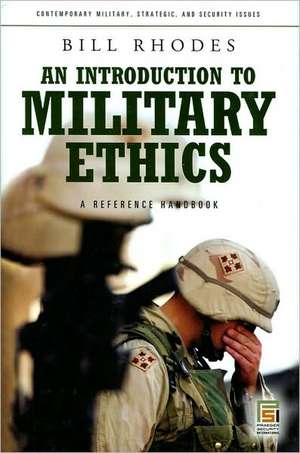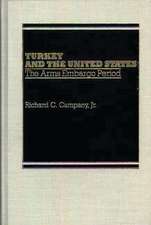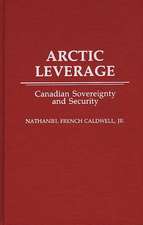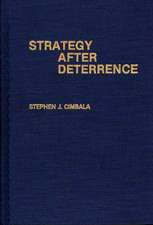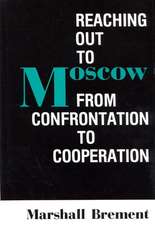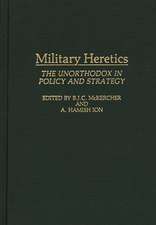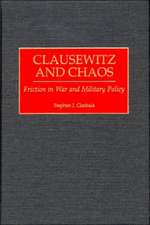An Introduction to Military Ethics: A Reference Handbook: Contemporary Military, Strategic, and Security Issues
Autor Bill Rhodesen Limba Engleză Hardback – 22 sep 2009 – vârsta până la 17 ani
Din seria Contemporary Military, Strategic, and Security Issues
- 19%
 Preț: 362.88 lei
Preț: 362.88 lei - 18%
 Preț: 301.15 lei
Preț: 301.15 lei - 18%
 Preț: 363.15 lei
Preț: 363.15 lei - 8%
 Preț: 349.67 lei
Preț: 349.67 lei - 27%
 Preț: 364.15 lei
Preț: 364.15 lei - 18%
 Preț: 320.42 lei
Preț: 320.42 lei - 27%
 Preț: 439.09 lei
Preț: 439.09 lei - 27%
 Preț: 346.07 lei
Preț: 346.07 lei - 24%
 Preț: 327.59 lei
Preț: 327.59 lei - 27%
 Preț: 345.42 lei
Preț: 345.42 lei - 27%
 Preț: 344.90 lei
Preț: 344.90 lei - 27%
 Preț: 364.06 lei
Preț: 364.06 lei - 14%
 Preț: 322.02 lei
Preț: 322.02 lei - 24%
 Preț: 363.98 lei
Preț: 363.98 lei - 24%
 Preț: 363.29 lei
Preț: 363.29 lei - 18%
 Preț: 300.68 lei
Preț: 300.68 lei - 27%
 Preț: 346.67 lei
Preț: 346.67 lei - 33%
 Preț: 371.40 lei
Preț: 371.40 lei - 28%
 Preț: 436.15 lei
Preț: 436.15 lei - 28%
 Preț: 436.99 lei
Preț: 436.99 lei - 21%
 Preț: 241.95 lei
Preț: 241.95 lei - 14%
 Preț: 350.16 lei
Preț: 350.16 lei - 18%
 Preț: 337.97 lei
Preț: 337.97 lei - 18%
 Preț: 302.10 lei
Preț: 302.10 lei - 27%
 Preț: 379.45 lei
Preț: 379.45 lei - 27%
 Preț: 364.40 lei
Preț: 364.40 lei - 18%
 Preț: 301.15 lei
Preț: 301.15 lei - 24%
 Preț: 462.45 lei
Preț: 462.45 lei - 36%
 Preț: 206.82 lei
Preț: 206.82 lei - 14%
 Preț: 336.57 lei
Preț: 336.57 lei - 14%
 Preț: 349.30 lei
Preț: 349.30 lei - 14%
 Preț: 337.50 lei
Preț: 337.50 lei
Preț: 363.56 lei
Preț vechi: 478.77 lei
-24% Nou
Puncte Express: 545
Preț estimativ în valută:
69.57€ • 73.15$ • 57.48£
69.57€ • 73.15$ • 57.48£
Carte tipărită la comandă
Livrare economică 17 aprilie-01 mai
Preluare comenzi: 021 569.72.76
Specificații
ISBN-13: 9780313350467
ISBN-10: 0313350469
Pagini: 176
Dimensiuni: 156 x 235 x 23 mm
Greutate: 0.43 kg
Editura: Bloomsbury Publishing
Colecția Praeger
Seria Contemporary Military, Strategic, and Security Issues
Locul publicării:New York, United States
ISBN-10: 0313350469
Pagini: 176
Dimensiuni: 156 x 235 x 23 mm
Greutate: 0.43 kg
Editura: Bloomsbury Publishing
Colecția Praeger
Seria Contemporary Military, Strategic, and Security Issues
Locul publicării:New York, United States
Caracteristici
Biographical sketches
Notă biografică
Bill Rhodes conducts research and development in professional ethics for his company, Aerworthy Consulting, LLC., in Franktown, CO.
Cuprins
PrefaceAcknowledgmentsIntroduction Ethics in the Real WorldChapter 1 An Overview of Applied Ethics for the MilitaryChapter 2 Just War Thinking (JWT) in Historical PerspectiveChapter 3 Philosophical Foundations of Military EthicsChapter 4 Jus ad Bellum TodayChapter 5 Jus in Bello TodayChapter 6 Adapting to Contemporary ChallengesChapter 7 Cultural Ethical IssuesChapter 8 Modern Military IdentitySelected BibliographyIndex
Recenzii
Rhodes has taught philosophy and professional ethics for over 16 years to military service members. Here, he offers an introduction to the study of military ethics, written for military officers, policymakers, and students. After a review of fundamental concepts, he focuses on the legacy of the "just war theory" and its application through history, then examines the application of that tradition in the modern era, with discussion of the use of military force in the name of a political community, and the ethical underpinnings of the rules of warfare. He also looks at emerging controversies faced by modern militaries, such as humanitarian intervention and dealing with nonstate actors, such as terrorists. Final chapters look at cultural issues in the modern military, including integration of women into the services, and address issues of professional identity. A glossary and a chronology are provided.
.a thoughtful introductory survey for nonspecialists. Recommended. Lower- and upper-level undergraduates, general readers, and professionals.
With the Army refocusing on its ethic, Bill Rhodes' handbook comes at a good time. The book is an excellent introduction to professional military ethics and a valuable resource to military professionals as we begin to seriously reexamine a critical component of the Army's foundation. . Because of its focus, the book is a good choice for those interested in exploring the topic of professional military ethics for the first time and those who want to reflect on their current views. The various topics and issues are laid out clearly and concisely and numerous examples illustrate and clarify the points being made. . Rhodes provides an excellent introduction to military ethics and he stimulates further reflection and research by the reader.
Rhodes's ability to translate often intricate and jargon-laden concepts into language that a midshipman or cadet could read and understand (or that faculty could walk into a classroom and teach) is one of this book's greatest strengths. One does not need to read far before being struck by how clearly and economically the author is able to communicate important issues of military ethics. With so much of the ethics literature hampered by overly academic language, this contribution alone is enough to commend the book. . Without question, An Introduction to Military Ethics should be required reading at the nation's service academies and ROTC programs. Discussing these issues as Rhodes presents them will not guarantee the proper moral formation of America's next generation of military leaders, but it will certainly prepare them to understand what is required of them morally as they enter and mature in their profession.
.a thoughtful introductory survey for nonspecialists. Recommended. Lower- and upper-level undergraduates, general readers, and professionals.
With the Army refocusing on its ethic, Bill Rhodes' handbook comes at a good time. The book is an excellent introduction to professional military ethics and a valuable resource to military professionals as we begin to seriously reexamine a critical component of the Army's foundation. . Because of its focus, the book is a good choice for those interested in exploring the topic of professional military ethics for the first time and those who want to reflect on their current views. The various topics and issues are laid out clearly and concisely and numerous examples illustrate and clarify the points being made. . Rhodes provides an excellent introduction to military ethics and he stimulates further reflection and research by the reader.
Rhodes's ability to translate often intricate and jargon-laden concepts into language that a midshipman or cadet could read and understand (or that faculty could walk into a classroom and teach) is one of this book's greatest strengths. One does not need to read far before being struck by how clearly and economically the author is able to communicate important issues of military ethics. With so much of the ethics literature hampered by overly academic language, this contribution alone is enough to commend the book. . Without question, An Introduction to Military Ethics should be required reading at the nation's service academies and ROTC programs. Discussing these issues as Rhodes presents them will not guarantee the proper moral formation of America's next generation of military leaders, but it will certainly prepare them to understand what is required of them morally as they enter and mature in their profession.
